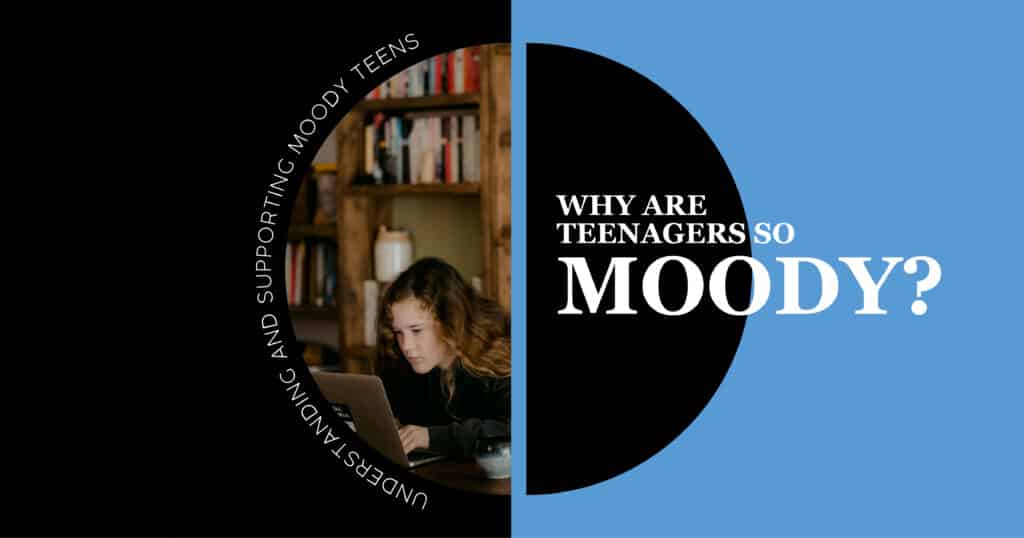Navigating the unique behavioral shifts of your self-absorbed teenager can be challenging. One moment, your teen is gleefully engaging with you, and the next, slamming the door and snarling at you like a feral cat. Teenage mood shifts are universal among parents across the globe because no parent seems to understand why their joy-filled children suddenly transform into sulking, glowering, and mute.
Adolescents get moody not by choice but as a result of the overwhelming changes, both mental and emotional, that self-aware teenagers undergo globally during their teenage years.
This guide intends to outline the primary factors of moody teens, explain some of the more troubling possible explanations, and present coping strategies for parents of teens who find it difficult to weather the unending gales of adolescence.
Why Are Teenagers Moody? Understanding Teenage Mood Swings
It isn’t just a stereotype when people say that teenagers could use a hand with managing their emotions because a teen’s life is overflowing with fluctuation of social, emotional, physical, and neural factors, and single-handedly managing all of that during this stage of life is rather complex. The chaotic nature of this stage of life is attributed to pubertal changes in the brain and body, fully developing social expectations and enabling the power of emotions.
Hormonal Changes and Puberty
Psychologists believe that physical and emotional changes such as puberty result in the greatest-centric behavior during the teen years. Striking changes in their bodies result in heightened hormone levels, eventually leading to intense emotions, irritability, and increased sensitivity.
How adolescents perceive and react to stress is primarily moderated by testosterone and estrogen, which tend to improve one’s reaction during stress. This is especially evident in the ‘mood swings’ of a teenage girl, where she can oscillate from a state of extreme rage to sadness and deep frustration.
These changes are complex and demanding to control for adolescents. At one moment, they can feel a surge of happiness, while at another, they could feel absolute anger or overwhelming sadness. These sudden changes are quite bewildering for not only the parents but also the adolescents themselves.
Brain Development and Emotional Regulation
Brain development is as prominent as hormonal changes in teenagers. This is particularly true for the prefrontal cortex, which is currently in development and is involved in coping with emotional control, future planning, decision-making, and impulse inhibition.
While all the activities mentioned above are still, in a way, “works in progress,” the amygdala, which is responsible for emotions, has reached its main phase. This leads to emotions becoming increasingly more powerful and reactions becoming abrupt.
With anger and intense feelings, even small problems can escalate into large arguments due to significant life changes. This can be seen in curfews, homework, or even chores. The emotional outburst and a lack of sanity will always make the person feel genuinely wronged.
That’s why empathy and understanding towards your moody teens will go a long way as a parent in building and solidifying the foundational bond you can have with your child.

Moody Teen Vs. Serious Mental Health Concerns
General shifts in a teen’s mood can be categorized as normal. However, there lies a deep-rooted concern when one partitions ever-changing moodiness into something more serious, which can require professional assistance. This requires parents’ special attention, for they need to figure out if their seemingly sulking teen is indeed battling with something more profound than just feeling hormonal.
If your child’s frustration, sadness, or anger is persistent and significantly affects different aspects of daily life, it might suggest something more profound. Depressive symptoms may include social withdrawal, inability to feel joy, reduced motivation to engage in activities they used to enjoy, or inability to sleep and overly sleeping.
Teens who feel nothing ever changes for the better, self-mutilate, or indulge in aggressive, emotional reactions demonstrate severe shifts in mood – all of which need mental health assistance.
Every single red flag mentioned above calls for different types of attention. However, these extremes need collective attention instead of varying responses tailored solely for volatile emotional responses.
How to Deal With a Moody Teenager: Strategies for Parents
The emotional charge that comes with raising an easily aggravated teenager can be made easier with the correct techniques in amending the living environment at home.
Set Clear Boundaries While Allowing Independence
Adolescents desire autonomy, but they also require guidance. Establishing defined parameters while allowing them to make independent decisions can help ease friction. Too much control can cause opposition, while being overly permissive creates uncertainty regarding rules. Resolute decisiveness and direction are optimal.
Encourage Open Communication and Active Listening
Some parents find it especially difficult to talk to their sulky teenager because talking tends to end in a fight. Instead of trying to explain, let them express their feelings. Refrain from jumping in to solve problems by providing unsolicited advice or critiques. Supporting their emotions and using open-ended questions go a long way in confirming their experience and making them feel valued.
Having no barriers leads to easy communication and helps avert problems where they feel judged. Simply letting out negative emotions alongside a validating statement without resolution holds excellent value.
Teach Healthy Coping Skills for Mood Management
Teens often possess high emotional intensity during this period but unfortunately, many teens lack the coping skills to manage their emotions effectively. Teaching responsible coping strategies and hobbies, such as journaling, is essential as these allow one to channel emotions constructively. Mindfulness techniques paired with artistic activities facilitate emotional processing.
Moreover, managing physical activities often enables the control of uncontrolled emotions and improves overall psychological well-being. Participating in physical activities aids endorphin release, which relieves tension and stress by greatly enhancing one’s mood.
Encourage your adolescent children to actively participate in sports and dancing or enjoy taking simple walks around the neighborhood, as these activities can significantly enhance their mental health.

Promote a Balanced Lifestyle: Sleep, Nutrition, and Exercise
Making wise choices in one’s lifestyle can impact one’s mental well-being. Sleeping also supports a teen’s mood, as it helps the brain regulate emotions properly. Enhancing sleep and mood for better outcomes can be achieved by cultivating a soothing nighttime routine, limiting screens, and having fixed sleep and wake times.
A person’s diet is also essential, as it affects moods. Consuming sugar, caffeine, or even processed foods can increase moodiness and fatigue. Maintaining emotional equilibrium involves consuming a well-balanced diet containing protein, complex carbohydrates, and healthy fats.
Another crucial component is working out. Exercise aids in stress alleviation, increasing self-esteem, and generally enhancing mood and well-being. Helping your teen find something they enjoy doing, whether it is yoga, hiking, or even participating in team sports, can tremendously boost their well-being.
Do Teenage Boys and Girls Experience Mood Swings Differently?
Teenage boys and girls experience mood swings at the same time during this period, but they handle them differently. Girls are more likely to talk about their feelings and emotions. For example, a teenage girl’s mood swings can include crying, throwing a tantrum, or simply being irritated.
Contrary to girls’ tendency to express their emotions outwardly, boys tend to be more reserved. Instead of showing sadness or frustration, they might withdraw from social interactions, becoming irritable and sulky, which does not indicate the child’s internal emotional state. Because of social expectations, boys sometimes must suppress their emotions, resulting in emotional rage.
Using these variations shifts a parent’s perception, especially after a discussion. Talking things through can benefit girls, while boys may need physical or creative activities to substitute verbal communication.
When to Seek Help for a Moody Teenager
Moody teens, like sulking or throwing tantrums within that time frame, are expected to be in the teenage phase. However, if these mood changes start affecting their performance at school and their relationship with friends and last for long periods, that is something to worry about. In such situations, professional help would be a good idea. Professional help would be vital in extreme distress signs such as feeling useless, persistently withdrawn behavior, severe relapsing alienation, loneliness, or uncontrollable and extreme anger.
If a silent teenager is self-harming or is contemplating suicide, there can be numerous problems underneath which require help. Taking steps to consult professional mental health resources can be of great assistance.
Teen Mental Health Treatment at Hillside Horizon for Teens
The Hillside Horizon for Teens professionals understand the challenges of having difficult teenagers. Our support staff is geared towards helping manage difficult emotions, building resilience, and developing coping strategies. We guarantee that appropriate treatment is provided for every challenge, be it depression, anxiety, or behavioral issues, so constructive healing can occur. Please contact us if your child demonstrates emotional lability with rapid and extreme changes. Hillside Horizon for Teens is here to help.
FAQ
Is it normal for a 15-year-old to be moody?
Of course, one of the reasons that explain teenage mood swings during this stage is the combination of hormones, brain development, and sociocultural factors. A certain level of mood shifts is normal, yet extreme or perpetual changes to one’s mood might require intervention.
At what age do teenage mood swings stop?
Because of hormonal balance, most emotionally volatile teenagers experience fewer mood swings around the age of 17 to 19. By the mid-20s, the person is a fully functioning adult, and around this age, emotional self-regulation is further refined due to brain development.
What causes mood swings during puberty?
As noted earlier, factors like school, friendships, friendships, sleep, and changes in the brain and hormones all contribute to mood changes.
How can parents help a moody teenager without pushing them away?
Foster unmerited praise, set limits, endorse all modes of communication, and promote healthy practices such as sleeping, exercising, resting, and relieving stress.
When should parents be concerned about teenage mood swings?
If emotions are extremely inconsistent, prevail over a period of weeks, or disrupt daily life through disengagement, enduring melancholy, or irresponsible acts, one has to reach out to professionals.




